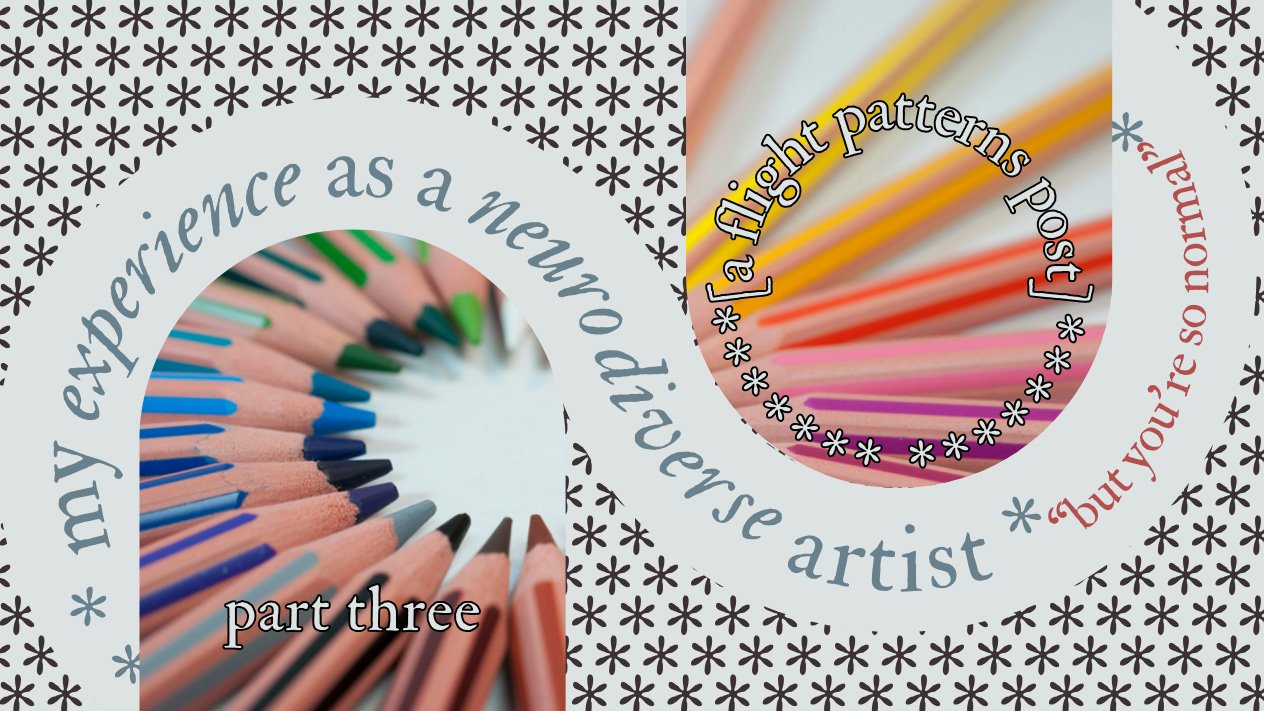If you’ve missed the first two posts in this series, please allow me to fill you in. Because of the lack of information about neurodivergent artists, I’ve decided to share about my personal experience with neurodivegence. So far, I’ve discussed disorganization, forgetfulness, social awkwardness, and looking for a magic fix.
In “the ‘magic fix’ idea,” I talked about the power that words can have when thinking about ourselves. Today, I’ll talk about the impact of words when sharing with others.
Sharing with others
Whether or not a person says anything about how their mind works is a completely personal decision. Some people prefer to keep a diagnosis private. They don’t want to be treated differently because of a label or condition. Other people are more open about being neurodivergent because such communication can smooth out some potential misunderstandings.
Personally, I lean towards this second option. Some of the pros and cons of this are:
Pros:
-In general, people are more comfortable with the odd behavior that comes with neurodivergence (such as fidgeting, stimming, and blurting) if they have context.
-Some of my behaviors (like too much/too little eye contact) come across as creepy. Explaining myself helps people feel more at ease with me.
-They are more likely to extend grace and compassion (but not always)
-It means you can make friends with other neurodivergent people! My closest and most genuine friendships have been with other people who are also neurodivergent.
-For me personally, it helps me feel more comfortable when I’m open about how my mind works. Not everyone feels the same way, and that’s okay. Some settings are more appropriate for this kind of sharing, and knowing which settings are which is not always a straightforward matter.
Cons:
-Being teased
-Being stereotyped (related: deliberately stereotyping oneself for validation)
-People saying, “You’re autistic/[insert term here]? But you’re so friendly/socially adjusted/normal.”
-People saying, “so you must be really smart then.” (See “Being stereotyped,” above.) In my life there were so many times where I would have traded doing good in school for being less socially awkward and a better friend to my classmates.
-People suggesting that I’m making things up/ ADHD is made up/ trying to diagnose me with something else.
-People telling me if I pray more/don’t eat sugar/etc. I’ll be “healed.”1
Preconceived ideas about neurodivergence
The most powerful (and risky) thing when it comes to sharing or not sharing about neurodivergence with others is that the words used convey a set of preconceived ideas.
This is just a basic function of language: when I say “Sam’s dog,” the image that comes to your mind is based on your experiences with dogs. If you’ve been bitten by a dog, you’ll have negative preconceived ideas, and perhaps be concerned for Sam. If you’ve had a friendly and loyal dog, you’ll assume Sam’s dog is friendly and loyal.
When this gets applied to people, the results are a little messier. When I say, “I have ADHD,” you might think about your friend’s brother, Kyle, who has ADHD, trains carrier pigeons, and loves Mario Kart racing. Now, if you assumed that since I have ADHD, then I love Mario Kart, you’d be mistaken. This is a silly example, but there are people who will make assumptions about me based on other people they’ve known.
Neurodivergence is a broad category. ADHD, autism, DID, bipolar, PTSD, dyslexia, are smaller categories. But people and their unique personalities and traits aren’t confined neatly to a category. It’s a two-fold situation: the neurodivergent soul already differs from the normative, on top of that, it doesn't perfectly align with the definition of what makes them different.
This is the “You’re autistic? But you’re so normal,”2 scenario again.
Due to a lot of hard work by my parents, counselors, mentors, close friends, and myself3, I am able to live a fairly normal life. But there are a lot of struggles only those closest to me see… like for some reason, managing laundry is an ongoing ordeal. In my upcoming posts, I’ll be talking more about what goes on inside my head.
One further point: What people want to be called is a personal decision.
-Some people say they “have [fill in the blank],” others say they “are [fill in the blank].” I’ve used both interchangeably.
-I appreciate the term “on the spectrum” because it implies that there are many different ways a person’s brain can work. However, some people dislike it.
-The term “Asberger’s Syndrome” has been used for mild autism symptoms and is helpful to to clarify the severity of a person’s situation. However, in 2018, this term fell out of favor because of the actions of the namesake of the condition. Some people still use it, some don’t.
I’m not saying these things aren’t helpful. In fact, spiritual health, eating well, and exercising have been some of the most effective ways to deal with the negative symptoms. But the idea of “healing” is deceptive because not all of neurodivergance is a bad thing. Some of it is actually great!
Yes… word for word something I’ve been told. They meant well and were being kind. (-;
The term for this group of supporting individuals is called a support network.





